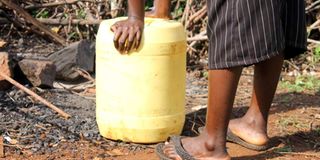AU officials: Dearth of data impeding war on child marriage

Many girls and a smaller number of boys enter into marriage without any chance of exercising their right to choose. Concerns have been raised about lack of comprehensive data.
What you need to know:
- African Union's senior social welfare officer says there is a challenge in how countries collect, store and share information on harmful practices.
- He called for cross-border collaborations to tame harmful practices like female genital mutilation and child marriages.
Lack of comprehensive data on child marriage is undermining the fight against the crime. This emerged during a meeting between the African Union Ending Harmful Practices Unit, and gender and human rights activists.
Participants said developing proper interventions needed to tame the menace calls for up-to-date data, hence strengthening systems and structures is paramount. They noted that lack of data was making it hard to mobilise or get funding for child protection initiatives.
Nena Thundu, the unit’s coordinator, termed it sad that there are no statistics on child marriage in many African countries. “There is a lot of information and statistics on teenage pregnancy but not the same case on child marriage. The AU is ready to work with governments and civil society organisations to end these harmful practices,” she said.
Head of the AU delegation Lefhoko Kasamang, a senior social welfare officer, underscored the need to have data to eradicate child marriage in Africa.
“There is a challenge in how we collect, store and share information and data on the harmful practices, among them child marriage. The data is critical to help us develop policies that speak to realities,” said Mr Kasamang.
Cross-border partnerships
He called for cross-border collaborations to tame vices like FGM and child marriages. “We are the ones who will end these harmful practices. Let us not assume that somebody else out there will come and end them for us.”
Child marriage rates in Kenya vary across regions and among ethnic groups. Available data indicate that 23 per cent of Kenyan girls are married before their 18th birthday and four per cent are married before the age of 15. Three per cent of boys marry before the age of 18.
Mwambi Mong’are, deputy director at the Directorate of Children’s Services, said Kenya is making strides, adding that the government will continue implementing initiatives that tame child marriage.
Also read: Unicef: War on child marriage far from over
Tony Mwebia, the founder of MenEnd FGM, noted that engaging men and boys is the way to go in the war on harmful traditons. “We have been pushing for the involvement of men and boys in ending these harmful practices and it is working. In fact, we have now been approached by countries like Sierra Leone, Ethiopia, Mali and Somalia so that we can teach them this strategy,” he said.
The AU delegation also held brief discussions with Labour, Skills Development and Social Protection Cabinet Secretary Florence Bore and Principal Secretary Joseph Montari. Ms Bore highlighted the steps Kenya has taken in addressing protecting children’s rights.
She said the Children Act, 2022, and the Sexual Offenses Act (2006) have exclusive rights, including prohibition of child marriages, and provide for harsh penalties against all forms of child abuse. She also cited the National Prevention and Response Plan on Violence Against Children 2019-23 and increased awareness.





